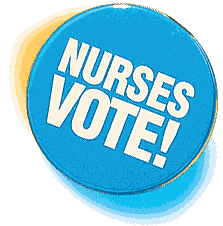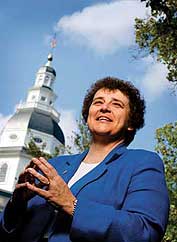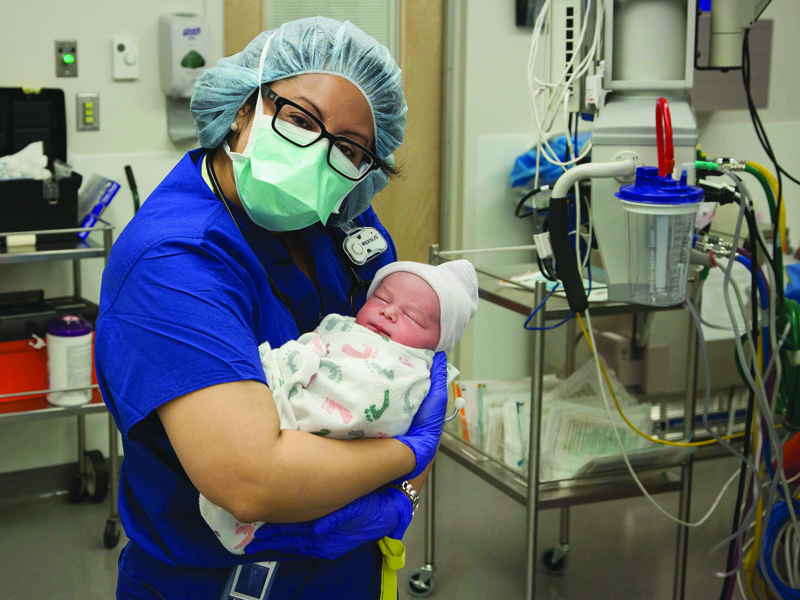
By some estimates, 1 of every 45 potential voters is a nurse. But in the legislative arena, the nursing profession lacks the clout these numbers suggest. Rosemary Mortimer and other politically-minded nurses at Johns Hopkins aim to change that. Their message to students and colleagues: It’s time for nurses to make their voices heard.
Lecturing on a desultory summer afternoon, Rosemary Mortimer, MSN, RN, seems to know just how to get the attention of 30 undergraduate nursing students.
“Is mandatory overtime important to you?” the veteran instructor asks, zeroing in on one of nursing’s hot-button issues.
“Yes!” several students answer back in unison, as others quietly nod in agreement.
“Then talk to the people in power,” Mortimer fires back quickly, the last word coming off as “pow-ah,” thanks to her thick-as-chowder Boston accent. “They’re going to make the decision on mandatory overtime — not the people in the nursing industry.”
It’s a message the students have heard from Mortimer before. The baccalaureate program at Johns Hopkins School of Nursing is about preparing leaders and educating nurses to practice in the real world of patient care. But Mortimer and a handful of like-minded colleagues are determined to force their students to look beyond the hospital unit, reminding them again and again that nursing is very much part of the world of politics and policy-making.
Their basic message is a simple but important one: Get involved. That means voting in elections and joining local and national nurses’ associations.
But it also means delving into the ins and outs of health-care public policy to understand how the system works. At health maintenance organizations, for example, the money for nursing salaries comes out of the same pot that pays for expensive diagnostic exams or administrative overhead.
Beyond financial issues, some nursing students are surprised to learn that the rules governing their profession — who can write prescriptions, for one — are generally established by state legislators, many of whom have no background in health care.

Mortimer continues her lecture, pointing out that nurses need to get down in the legislative trenches and explain the issues to the political powers-that-be.
” That is my challenge to you: Get involved,” she says, winding up her lecture. “If we don’t get involved, we have no power.
“ With more than 2 million registered nurses in the nation, the nursing profession should be a force to be reckoned with in political and public-policy debates. By some estimates, one out of every 45 potential voters is a nurse. In reality, though, the nursing profession does not have the clout its numbers would suggest. “We have never been able to make our voices heard the way they need to be heard,” Mortimer says.
Longtime nursing advocates cite two key reasons.
“There’s an incredible demand on nurses’ time,” says assistant professor Peggy Soderstrom PhD, RN, who has worked on public policy issues affecting nurses for years. Nurses often juggle demanding work schedules and family needs, she points out. Getting involved in politics is often not perceived as an important priority.
Perhaps the more pressing concern involves money for lobbying. Nurses, as a group, are paid less well than physicians and other health-care professionals. That means nurses have fewer funds to devote to political and lobbying efforts. As a result, nurses typically get outspent significantly in the political arena by physicians or other health-care players such as insurers or hospitals. ”Nurses have never had a lot of power because we don’t have the money,” says Mortimer, a nurse for three decades and a political activist for even longer. “The lobbying power in health care has always been in medicine because they have the money.”
Mortimer, Soderstrom, and other faculty members, including Susan Appling, MS, CANP, and Janet Selway, MSN, CANP, infuse policy and politics into several courses at the School of Nursing. Aside from attending lectures on the subject, students spend at least one day in Washington, DC, talking with policy makers and gaining an understanding of how the legislative process works.
Faculty members also encourage students to take part in nurse lobbying nights in the Maryland capital of Annapolis — an annual event designed to give nurses and nursing students a taste of the state legislative process. The event attracts dozens of students from Hopkins and other schools. Two years ago, some students testified at legislative hearings as part of a successful effort to increase the amount of funding for Maryland nursing scholarships.
Likewise, several School of Nursing faculty members hold key roles in nursing groups. Soderstrom, for example, serves as co-chair of the Maryland Nurses Association Legislative Committee, a group that works actively in the state capital. She also worked as a lobbyist for the Maryland Association of Nurse Psychotherapists, giving her an up-close look at what was often a frustrating legislative process.
Nursing at Hopkins has long had ties to the broader world of politics and public policy.
Lavinia Lloyd Dock, who worked as assistant superintendent at the school for three years beginning in 1890, played a major role in bolstering the profession of nursing, writing columns, a history of nursing, and a textbook. She also understood the power of organizing and helped launch nursing organizations at the state, national, and international levels. Dock went on to play a role in the women’s suffrage movement, understanding that some of the problems faced by female nurses were part of a broader pattern of gender discrimination.
Adelaide Nutting, an early superintendent of the school, worked to pass a law creating the Army Nurse Corps, which provided increased standing for the nurses serving in the Spanish-American War.
Nutting helped run a grass-roots lobbying effort, she wrote, by getting “committees of nurses organized in various States throughout the country, to keep them informed about the progress of the Bill, and to urge them to acquaint their Members and Senators with the need for a properly organized Army Nurse Corps.” The issue turned into a turf battle and the lobbying work “grew to such dimensions that it took up almost my entire time for the better part of the winter,” Nutting wrote. The bill passed.
Today, it is generally agreed that nobody at the School of Nursing is more passionate about the need for nurses to get involved in politics than Rosemary Mortimer. She is the one, after all, who runs a voter registration campaign at the school each year.
Outside her cramped, fourth-floor office, a sign is wedged behind the name plate on the wall. “Nurses Vote!” reads a blue-and-white sign — as much a demand to her students and colleagues, as a reminder to legislators.
The admonition to get politically involved stems from Mortimer’s earliest upbringing. As a girl growing up in an Irish-Catholic area of Dorchester, Mass., Mortimer didn’t view politicians as bad people; they were her neighbors. A state legislator lived behind her and Francis E. Kelly, the state attorney general and lieutenant governor, lived down the street. A retired mayor of Boston lived in the neighborhood as did Eddie McCormack, another state attorney general and the nephew of John W. McCormack, once the speaker of the U.S. House of Representatives.
Spurred on by her politically involved neighbors and family, Mortimer began working polling places at age 10 and went door to door for candidates as a teenager. After graduating from Boston University, Mortimer joined the U.S. Army Nurse Corps and served in Washington state. She lived in Europe and Oklahoma before settling with her husband in Maryland.
In 1994, she decided it was time to put her own name on the ballot, in a run for the Maryland House of Delegates. Running against two other politically active women, Mortimer touted her experience as a nurse, particularly in obstetrics.
“When you work labor and delivery, you take care of anyone who needs you — anyone who walks through the door,” she wrote in one campaign brochure, which included pictures of Mortimer holding a baby. “I think we need some lawmakers in Annapolis who know what it’s like in the real world.”
Mortimer lost to a candidate with broader name recognition — but treasures the experience and may run again for elected office. “That’s the thing I tell the students — run for office,” Mortimer says. “When you run, it can be the most exhilarating and depressing time in your life. When you lose, the sun will come out tomorrow. And you end up with credibility. You were the one to put your name on the line.”
Sherry Pikul, BSN, who graduated from the school last spring, says Mortimer provides a vital lesson for nurses in training. “Rosemary has a really big voice; she’s so passionate about it,” says Pikul. “What she says is very right — the idea that you have to do it yourself, that no one is going to do it for you.” Although many nurses view political activity as a natural part of their profession, some have become involved in political activities only after experiencing an on-the-job challenge.
Janet S. Selway, MSN, RN, ANPC, PNP-C, a clinical instructor at the school, experienced a crisis two years ago when she was stuck with a needle contaminated with blood from a female patient — what she terms “the most god-awful incident in my life.”Authorities were unable to obtain permission to test the patient for HIV, leaving Selway to worry about whether she had contracted the virus. Ultimately, she didn’t, but the experience prompted her to work for a change in the law. She told her story to the Governor’s Commission on Nursing, which in turn pushed for legislation to make it easier to require a patient to be tested for HIV after a needle-stick incident.
Lawmakers who often pay little attention to testimony on bills paid rapt attention to Selway’s personal story. “The legislators listened to me; they really listened,” Selway says. The bill passed.
Selway and others at the school were also involved in a years-long effort to allow insurers to list nurse practitioners as primary care providers on their list of providers. The nurses bombarded senators with visits, e-mails and phone calls. A key moment in that effort came when the state Senate approved the legislation by a single vote. Around the time of the vote, the president of the state Senate looked up into a gallery filled with nurses and asked for the phone calls to stop.
Smiling that day was Maryland Sen. Paula C. Hollinger, a nurse and a member of the state legislature for 25 years. Hollinger holds an important post — chairwoman of the Education, Health and Environmental Affairs Committee, which handles much of the legislation affecting health-care workers.
She is also one of five nurses in the Maryland General Assembly — thought to be the highest number of nurses in any state legislature in the nation — and she often challenges nurses to get involved.
” I have been on what I call a ‘toot’ with nurses ever since I got into office — basically to try to empower them,” says Hollinger.
“They are the largest health-care profession without question. If they use their political power, they could be more effective than any other group of health-care professionals.” ” They are wonderful advocates for their patients, terrible advocates for themselves,” adds Hollinger.
Bret Schreiber, assistant director of the Office of State Relations for Johns Hopkins University, agrees that Nursing’s faculty and students need to be participants in the political process. “Our politicians make decisions that have tremendous impact on the nursing profession,” he says. “If we can educate them about nursing and the amazing things nurses are doing, we will have a better chance of impacting policy decisions that help the profession.
While the 188-member Maryland legislature has five nurses, the 535-member Congress has only three. Rep. Lois Capps, a California Democrat, helped found a Congressional Nursing Caucus this year to raise the visibility of issues in Washington affecting nurses — whether it’s funding for the Nurse Reinvestment Act, questions about smallpox vaccinations for health-care workers, or the plight of uninsured Americans.
Like Hollinger from Maryland, Capps sees great potential in the power of nurses. Those who testify and lobby in Washington are well-received and work from a built-in advantage: “Nurses are very trustworthy and they have a lot of good common sense ideas,” says Capps, who previously worked as a school nurse in Santa Barbara, California.
” In my stump speech, I tell nurses that I sympathize with them; their work is tough. But we really could change the priorities of our country if we put our minds to it. There is such an active need for professional voices to speak up.”
Of course, nurses have other allies in Congress besides the three nurse congressmen. Sen. Barbara A. Mikulski of Maryland, herself a former social worker, sponsored the 2002 Nurse Reinvestment Act, which authorized scholarships and loan repayments for some nursing students and other benefits for nurses. Since passage of the bill, Mikulski has worked to win enough funding to fully implement the Act’s provisions.
Among those who went to Washington to lobby for funding for the measure were students from the School of Nursing.
” America needs you,” Mikulski told the group of Hopkins students. “And if America needs you, we need to make sure that America backs those who choose to be in nursing, those who stay in nursing and those who want to teach in nursing.”
The series of charts on the overhead projector paints a troubling story, which assistant professor Sue Appling uses to remind students about the big-picture problems facing the U.S. health-care system. Again and again, the charts show that American health care is more expensive than that of other industrialized countries — more than twice as costly on average.
” This can’t go on; we just aren’t getting the bang for the buck,” Appling tells a group of students during a lecture. “And you are going to have to be in there lobbying.”
Like Mortimer, Appling injects public policy concerns into nursing instruction whenever she can. A veteran of Maryland legislative efforts involving nurse practitioner bills, Appling long ago realized that there is the legislative process depicted in civics textbooks — and the process that takes place in the real world.
Several years ago, she tells her students, nurse practitioners were seeking legislative approval to dispense prescription drugs. During a committee hearing on the bill, one male lawmaker all but chuckled at the notion of nurses being able to write prescriptions.”The next thing you girls will want is to do surgery,” the old-time legislator told the nurses.
The nurses, though, had the last laugh when their lobbyist convinced the committee chairman to call for a vote on the bill when the antagonistic legislator was out of the room. ”
There’s no way any of us on the nurse practitioner legislative committee could have done that,” Appling says with a smile, recalling the savvy lobbying technique.
Appling knows that such lessons about the legislative process are learned through experience — making it all the more important for young nurses to get involved and learn. ”
They don’t need to sit in a classroom and hear how we did it, but to get involved and participate — testifying on a bill for example,” she says. Andy Benson, BSN, a May 2003 graduate of the school agrees. Benson, a native of Montana, says the Hopkins program “did a pretty good job of planting the seed” about the need to be active beyond the workplace. He took up Mortimer’s request to attend a Nursing Night in Annapolis to learn the basics of lobbying. He considers it time well-spent.
” We talked to some of the state delegates. That was just a great learning experience,” he says. “The next time we won’t need to have one of our instructors there. They’ve given us the knowledge to get involved,” Benson adds. “We just need some real-world experience to get some credibility.”
There are no lack of issues for nurses to stay focused on, both in Washington and the 50 state capitals. The most pressing is the ongoing nurse shortage. While Congress took a first step by passing the Nurse Reinvestment Act, debate continues on how much federal money to commit to the effort.
There is also a shortage of qualified faculty members willing to teach at salaries that are often not competitive with on-the-job nursing salaries. And there will continue to be battles over giving patients direct access to nurse practitioners and other advanced-practice nurses. But nurses will also continue to play a role in issues not directly related to the profession — among them issues involving America’s vast population of uninsured, gun control, and the therapeutic use of marijuana.
Appling has been involved in nursing policy issues for many years and sees more sophistication in the nursing community’s approach now. “Years ago, the only time you’d see nurses in Annapolis was on education issues,” Appling says. “Today, nurses in general have a better understanding of why it’s important to know their legislators.”
If not, she and others, particularly Rosemary Mortimer, will be there to remind them.
“If we as nurses are not involved in the political process, we will always be destined to be standing behind the tables of power,” Mortimer says. “If we want to make changes, if we want our profession to be highly thought of, we must be the ones to get involved. ” It’s that simple.”
Tom Waldron writes from Baltimore.
 The ELNEC Toolbox
The ELNEC Toolbox The Picture of Health
The Picture of Health New Orleans Nursing: It’s High Time for Help in the Lower Ninth Ward
New Orleans Nursing: It’s High Time for Help in the Lower Ninth Ward American Nurse Project Taking RNs to Big Screen
American Nurse Project Taking RNs to Big Screen Hill’s Side
Hill’s Side







